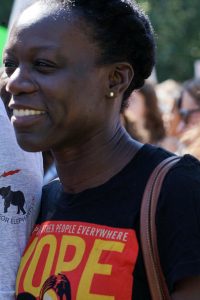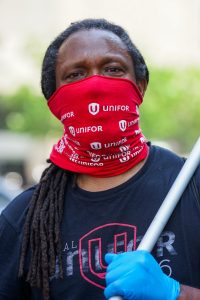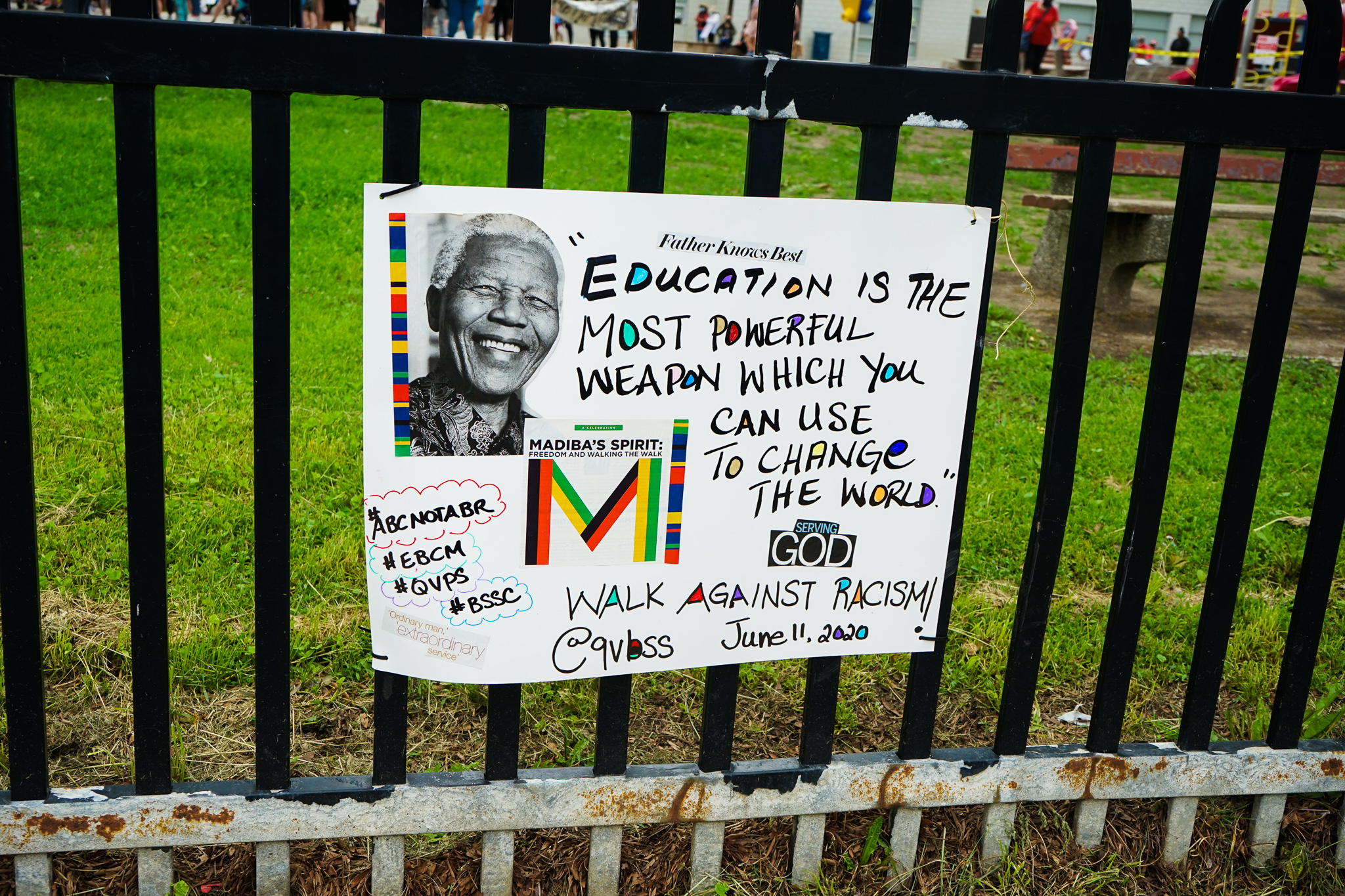Deconstructing anti-Black racism: an interview with the authors
Tiffany Barrett, D. Tyler Robinson, Remy Basu and Kiersten Wynter, authors of the high school course, “Deconstructing anti-Black Racism in the Canadian and North American context” took time to talk to School Magazine about their thoughts on how they see the curriculum moving out to other students and people’s reaction to it, so far. There are some sharp insights here about organizing to get this information in front of more students, the relentless push to move it forward as well as their comments on how its ben received.
School Magazine: You’ve developed and used this curriculum with your students. When will other students be able to see it?
Tyler: We’ve talked with the Executive Team at the TDSB and they haven’t disagreed with our call for this to be a system-wide course. They also haven’t disagreed with our call to use the TDSB’s weight as the largest school board in the country to move the Ministry of Education to implement this as a foundational course – required for high school graduation.
Now that this conversation about an anti-racism course is going on in other provinces. Other ministries of education across the country may be considering similar steps. Often, in the academic space, business and what have you, Ontario leads in efforts for change. So, we’re trying to hold our school boards and our Ministry of Education to account to lead on this issue.
Kiersten: We originally wanted to create a course for Newtonbrook SS, but after two of us had to change schools last summer, we began to talk about the idea of creating a Ministry mandated course. For me that seemed like a nice hope to have and that maybe one day it would happen – it seemed like something in the future. To see that within eight months of pushing, we could sit down with the Ministry reinvigorated in me. We can make change and we can push forward and we can create pressure within the system.
I have the impression that they were there to listen and observe. There wasn’t much reaction; no one is going to say that what we are doing is bad. No one is going to disagree with what we are doing, but I think that Ministry people are used to systems and processes and a specific way of doing things and we’ve operated outside that way for the creation of this course.
creation of this course.
Tyler: Realistically, the Ministry needs to consider all of the boards. We’re talking about this anti-Black racism course and we think its relevant for all students. As Black folk, we also think it would be relevant for our kids to receive anti-Indigenous racism education and maybe a compulsory course if that’s what Indigenous communities want.
Yet we don’t want to position our course as important because all Black students are struggling. There are plenty of examples of Black excellence and student succeeding despite the odds. But there are systemic issues that lead to young Black students being disengaged and the result of that is disproportionately low academic outcomes – specifically for the Black community and also for the Indigenous community.
In the same way that school renaming has to be equitably done, we’re saying this anti-racist education which has to happen, has to be done in an equitable way. We can’t argue anything like “my oppression is greater than your oppression,”but we can look at the data on student outcomes and say “we might need more work in these areas”
School Magazine: What has the reaction been like in general from the community?
Tiffany: The first day, the energy in the classroom was intense. When we went over the unit, I got a sense that the kids were tired of the typical things they would hear every February about Black history and Black excellence. They wanted more; they wanted to dig deeper. This course would tackle all the questions that they had.
As for as staff and administrators– they know there is a need, but there is this fear. It’s not that they don’t want to do it, but there’s just so much fear surrounding the argument of racism and race-related topics. They’re open to trying. That’s why we think education cures. If we go out there and show them how to do it, we’ll have more people on board. Show them that this work can be done – and you don’t have to be Black for it to be done. We all can work together to get it done.
They’re open to trying. Thats why we think education cures.
Remy: We did an info session for the parents at Northern Secondary, a school of predominantly white children – quite a privileged TDSB school. Even the principal was quite surprised at how well received the course was and this was just an info session for the Parent Council. In the Chatbox after, there was a lot of praise for this course, discussion around it being mandatory. These were largely white community members saying “Yeah, we get it. We want it too.” At the end of the day, the course is going to run at a school like Northern. It’s really helpful when we get feedback from that demographic. The local trustee was behind It and the area superintendent was behind it. Sure, there is negativity out there, but by and large we are getting a lot positivity. All of us get emails from people from all walks of life saying “congratulations” and wanting to share their stories.
When we think about the Ministry and what it needs to do about making this course mandatory, I think it’s having a bit of a reckoning about the curriculum. Let’s decolonise. I know it’s slow; I know it’s the Ministry – there’s a lot a bureaucracy. But I think that now we have a lot of leverage and we’re now holding people accountable. People are starting to, if not jump on board looking for actionable items to do.
Tyler: I got a message, after doing a CTV interview this morning, from a 50- year old man who told me “I’d like to take this course, but I can’t because I work all day. But I’d really like to ask you a question about this one thing – whether it’s racist.” I think that underscores the point that we haven’t done this work in a systematic kindergarten through 12 way. So, you have adults who have lived all their lives with questions like these. All along, folks could really avoid this conversation.
 Remy made the point yesterday, it’s not about calling out. It’s about calling in for support. One place where I see resistance is that parents have said: “I want to contact my local school to get the course and can you help me.” And sure, a hundred percent, our team will support schools in implementing the program. We’re working with the TDSB to put together professional development for teachers, for administrators along with resources so this can be done. But I tell parents who ask, most likely your principal is going to say “no.” It’s not because principals are bad people or racist, per se, it’s that they’re thinking: “we already have a course like that” or “we already have a social justice curriculum and we’ve addressed that” or “I don’t have a teacher for it.” This is where the system gets in the way.
Remy made the point yesterday, it’s not about calling out. It’s about calling in for support. One place where I see resistance is that parents have said: “I want to contact my local school to get the course and can you help me.” And sure, a hundred percent, our team will support schools in implementing the program. We’re working with the TDSB to put together professional development for teachers, for administrators along with resources so this can be done. But I tell parents who ask, most likely your principal is going to say “no.” It’s not because principals are bad people or racist, per se, it’s that they’re thinking: “we already have a course like that” or “we already have a social justice curriculum and we’ve addressed that” or “I don’t have a teacher for it.” This is where the system gets in the way.
So, we’re beginning now to partner up with parents and provide them with the “edubabble” – the educational conversation that’s necessary to move past those barriers. It helps to provide answers like: “If you already have a social justice curriculum– great. But you don’t not teach chemistry because you already have biology – these subjects are complementary” or : “If you’re already doing anti-Black racism work in your English course and whatnot – wonderful! We’re providing space to go deeper and: “if you don’t have a teacher who can teach the course material, perhaps you have a discriminatory hiring practice – maybe that’s a component of the white supremacy and covert racism that’s operating within your school that you didn’t even realize.”
By partnering up with parents now, we can help them know: “These principals and these superintendents and these trustees work for you. We teachers also work for you – and we work for kids. Any of the bullshit that’s getting in the way of parents and students getting what they need, is part and parcel of the problem. We’re helping not only deconstruct racism in the class, but also deconstruct the racism parents are encountering as they try to push this work forward.
Kiersten: As we do this anti -racism work it remains evident to me that there are pockets of other people doing this work already: “I’ve started a course” or “there was this course one time but it went away.” We’re not the first people doing this. We get praise and encouragement, but we’re always cognizant that people have been trying to move this work forward. The position that we’ve taken is – it’s now. Now is the time for us to come together.
We’re helping not only deconstruct racism in the class, but also deconstruct the racism parents are encountering as they try to push this work forward.
We have a bird’s eye view from having the ability to talk to the Ministry, the ability to talk to the TDSB. We’ve had the ability to talk to parents, see students. We see different boards. We see an overarching view of what’s going in and I think our role is to connect, to provide spaces within the system so that individuals who want to do this work now can get started while we are waiting for bureaucracy.
We always said: ”Regardless.” Regardless of you feel, how you react, this programme will move forward. It started with one school and every week we get emails with more people saying, “yes!” We’re having more sessions to invite more interested people in. We don’t have to wait for someone else to give permission to do what is right. You take the resources you have; you share and you get together with other people who feel the same way you do and you create change. That’s what this team has taught me. Alone, I would never have been able to do this, but when we got together as four like-minded teachers with an action-oriented goal, this is where we ended up.
There’s a lot of fear that this has not been done before. I have not trod here before. We’re not special; we don’t have all these tools and PHDs, but I think this work is important so I’m going to learn and get on the bandwagon. It’s a process – and as long as you do it with humility and a sense of justice with your community, it’s going to be okay. It will be alright.
School Magazine: Would you talk about the issue of some hate mail you’ve received because of your work?
Kiersten: When we received hate mail, it came right after a high of just getting off a really good meeting with people saying, “let’s work forward.” Receiving the mail after was kind of like “oh – okay…” If I had received that a few months ago, it would have shaken me; it would have made me question why I’m doing what I’m doing. This is not what I had in mind when I started – all I wanted to do is make a little course for kids.
But through this process, I’ve kind of equipped myself. This is what studying anti-Black racism does. It equips you. I know my history. I know that I’m not alone. I know that I have community and I know that this is not the first act of this nature and I know that it’s not by any means, the worst. It gives me the shield that protects me from those who would wish harm. I feel that is because of the learning; that is because of the community.
Those people exist. They’re out there; we recognize them and we want to give our students a tool to cope with it. So that when it happens to them – and it’s going to happen – they’ll know their history and know that they’re not alone. They’ll know that it’s taken place before and will not allow the hate to harm them in such a way that they cannot move forward. That’s what I want for students.
Remy: When that came out – to put it simply- it can’t all be roses when you talk about racism. But it also gave us fuel. Look what happened: of course, we need this course. After that happened and the story went to the media, Tiffany and myself got an email from a student who Tiffany taught. She was able to articulate what had happened to the four of us; she was able to show us compassionate empathy. So, this course did exactly what we wanted it to do. She saw this incident that happened; she could critically look at it. She got angry, but she could break it down and then make sense of it. Her email was really well-put; it was a lovely sentiment for her to send it. But I think because she took the course, she could deconstruct what was happening in that environment.
I’m mindful of this being a generational effort.
Tyler: When you shake the tree, bad apples fall out. I’m mindful of this being a generational effort. Generations ago, our ancestors would just be pulled out of the house and killed. The next generation, our ancestors were getting beat up by the police – that still happens today. But then you progress a little forward and it’s like “ok – there’s this covert racism that prevents Black folks from getting a fair opportunity in jobs and so on. It’s not to say that awful acts are no longer occurring, but that, in general, what we see is that the trend line is moving forward. That’s not to say that the work is done – that we’ve arrived at this post-racial society. We know we haven’t.
I have a family member who moved into New Orleans and woke up in the morning in his new house to find a cross burning on his front yard. He lived across the street from KKK leader, David Duke. Today, we have some anonymous person hiding behind their computer screen. The Ku Klux Klan used to invoke a whole lot of fear. Now KKK members invoke zero fear from me; they invoke compassion and empathy, because I understand that they’re losing something within their humanity by being unwilling and unable to see myself and folks who look like me as equal human beings. I feel compassion; I feel sorry for them and that hate letter we got invokes zero fear.
What we’re doing is what every generation of Black folk have been doing. We’re trying to move the ball a little bit forward; we’re trying to move the ball a lot forward maybe. We’re not trying to equate ourselves to the great leaders in Civil Rights history. We’re just saying it’s incumbent upon all of us to do our little bit.


